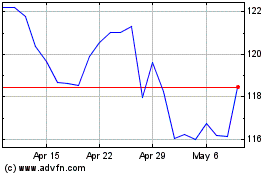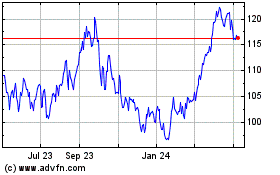By Amy Harder and Bradley Olson
Exxon Mobil Corp. is ramping up its lobbying of other energy
companies to support a carbon tax, marking a shift in the oil
giant's approach to climate change as the industry faces growing
pressure to address the politically charged issue.
Exxon's official position has long been the same -- a carbon tax
is the best way to address the risks of warming temperatures -- but
it has done little to actively advocate for that goal in recent
years. Lately, Exxon has been making the case with its U.S.
counterparts to support a carbon tax, arguing that the industry
must not oppose all climate policies, according to people familiar
with Exxon's thinking.
Top Exxon officials have been more vocal about their support for
a carbon tax and have met with Capitol Hill offices about related
legislation, according to the company's recent lobby disclosure
forms.
For the past six months, Exxon has been asserting its position
more in meetings within trade associations, including the American
Petroleum Institute and American Fuel and Petrochemical
Manufacturers, according to multiple reports from people who have
attended meetings with Exxon officials.
"Of the policy options being considered by governments, we
believe a revenue-neutral carbon tax is the best," Suzanne
McCarron, the company's vice president of public and government
affairs, wrote in May in the Dallas Morning News.
A straightforward carbon tax that is revenue-neutral -- meaning
other taxes should be lowered to offset the impact -- is far
preferable to the patchwork of current and potential regulations on
the state, federal and international levels, according to Exxon
spokesman Alan Jeffers.
Mr. Jeffers said Exxon's position hasn't changed and pointed to
a recent House vote on a resolution condemning a carbon tax and the
global climate deal in Paris agreed to last December as reasons for
the increased debate within the industry.
A carbon tax would put a price on each ton of carbon emitted.
Where in the production and consumption process the tax would be
levied depends on individual proposals.
"Previously Exxon's positioning on a carbon tax had been passive
-- 'Hey, we're not loving it, but we're not going to get in the way
of it,' " said Michael McKenna, president of the energy lobbying
firm MWR Strategies, whose clients include oil and refining
companies, but not Exxon. "In just the last six months, there's
been an uptick in how they are asserting themselves in meetings
about how to address this issue."
Exxon, the world's largest publicly owned oil company, arguably
faces more pressure than other firms to show concern about climate
change. At least two Democratic state attorneys general are
investigating whether the oil giant has conspired to cover up what
it knows about the impact of global warming.
The U.S. Virgin Islands attorney general agreed to withdraw its
subpoena, according to a legal filing Wednesday. Exxon is
challenging these investigations and has described them as
politically motivated attacks that violate its constitutional
rights.
In actively pushing for a carbon tax behind the scenes, Exxon
becomes the first major American energy company to move closer to
the positions of European energy firms, including Royal Dutch Shell
PLC and BP PLC, which have publicly advocated for a price on
carbon.
Congress has made it clear it is unlikely to consider a carbon
tax soon, especially under Republican control. But some in the
energy industry believe a serious debate on additional climate
measures isn't far off, especially if Democrat Hillary Clinton wins
the White House in November.
The House vote in early June to condemn a carbon tax accentuated
a widening rift within the industry over how, or whether, to engage
on climate policy. The split is pitting smaller companies,
especially domestic refiners, against multinational and European
firms.
One senior U.S. oil executive said Exxon, like some other oil
and gas companies, could also have a financial motive for
supporting a carbon tax. Such a tax would make coal more expensive
compared with natural gas. Exxon, beyond its oil business, is the
U.S.'s largest natural-gas producer.
Mr. Jeffers, the Exxon spokesman, said his company has invested
in gas in anticipation of climate policies that make coal more
expensive.
Few, if any, U.S. companies other than Exxon have called for a
carbon tax, and many oppose any plan designed to cut emissions.
Chevron Corp. CEO John Watson, for example, is one of several
outspoken opponents of a carbon tax.
Exxon's shift is unfolding against the backdrop of a landmark
deal to cut greenhouse gas emissions struck by roughly 200 nations
last December in Paris. Energy companies are also facing increasing
pressure from federal regulators, and their own shareholders, to
disclose potential business risks from the global efforts to reduce
greenhouse gas emissions. Exxon shareholders in May narrowly voted
down a resolution calling for a stress test to determine the risk
that efforts to curb climate change pose to its business.
Exxon first publicly supported a carbon tax in 2009, presenting
it as preferable to cap-and-trade, a market-based system for
controlling carbon emissions that the Democratic-controlled
Congress then appeared ready to enact. Cap-and-trade died in the
Senate, the Republicans later captured Congress, and President
Barack Obama has since pursued regulations to cut carbon emissions
instead.
Some advocates of strong climate policy are skeptical Exxon's
shift signals a deeper change. "We've seen so little movement out
of any of their lobbying front groups," said Sen. Sheldon
Whitehouse (D., R.I.), who introduced a bill last summer to impose
a carbon tax. The measure hasn't advanced in the Senate.
Mr. Whitehouse's staff recently met with Exxon lobbyists, but
the senator said, "The meeting was more just an exploratory feeler
to see about further conversations."
Write to Amy Harder at amy.harder@wsj.com and Bradley Olson at
Bradley.Olson@wsj.com
(END) Dow Jones Newswires
June 30, 2016 05:44 ET (09:44 GMT)
Copyright (c) 2016 Dow Jones & Company, Inc.
Exxon Mobil (NYSE:XOM)
Historical Stock Chart
From Mar 2024 to Apr 2024

Exxon Mobil (NYSE:XOM)
Historical Stock Chart
From Apr 2023 to Apr 2024
